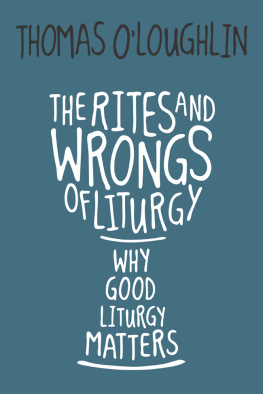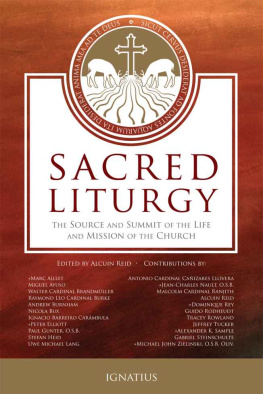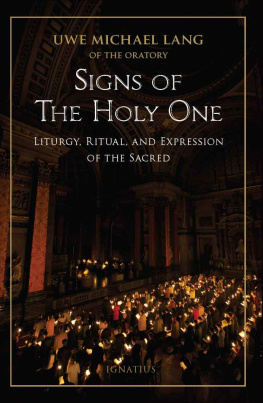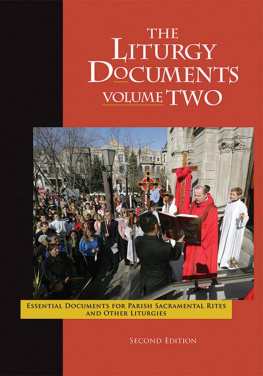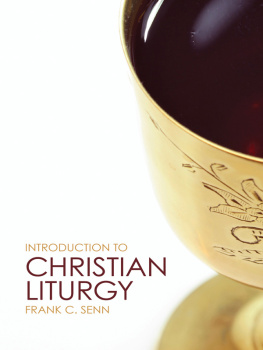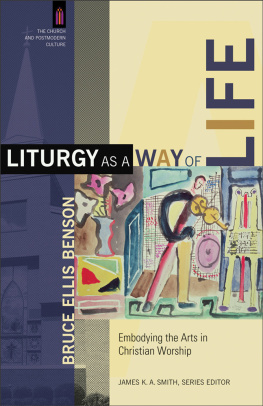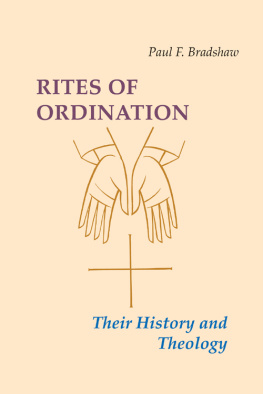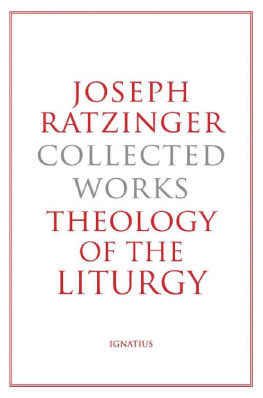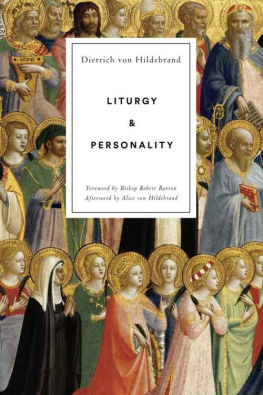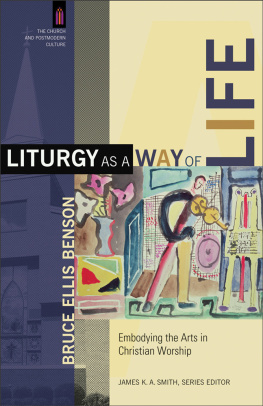Cover design by Amy Marc.
Scripture texts in this work are taken from the New American Bible, revised edition 2010, 1991, 1986, 1970 Confraternity of Christian Doctrine, Washington, D.C. and are used by permission of the copyright owner. All Rights Reserved. No part of the New American Bible may be reproduced in any form without permission in writing from the copyright owner.
2018 by Order of Saint Benedict, Collegeville, Minnesota. All rights reserved. No part of this book may be reproduced in any form, by print, microfilm, microfiche, mechanical recording, photocopying, translation, or by any other means, known or yet unknown, for any purpose except brief quotations in reviews, without the previous written permission of Liturgical Press, Saint Johns Abbey, PO Box 7500, Collegeville, Minnesota 56321-7500. Printed in the United States of America.
Library of Congress Cataloging-in-Publication Data
Names: OLoughlin, Thomas, author.
Title: The rites and wrongs of liturgy : why good liturgy matters / Thomas OLoughlin.
Description: Collegeville, Minnesota : Liturgical Press, 2018. | Includes bibliographical references.
Identifiers: LCCN 2018009877 (print) | LCCN 2017050487 (ebook) | ISBN 9780814645888 (ebook) | ISBN 9780814645635
Subjects: LCSH: Liturgics. | Rites and ceremonies. | Public worship.
Classification: LCC BV176.3 (print) | LCC BV176.3 .O46 2018 (ebook) | DDC 264dc23
LC record available at https://lccn.loc.gov/2018009877
For Mary Paul Clarke, OSC
in gratitude for all her support
Contents
Preface
Whats worth doing, is worth doing well! is a maxim that has rung in my ears since my childhood, and we all know that its true! Yet, when it comes to celebrating the liturgy, doing it well can be very difficult. Even when a great deal of effort has been expended, it may still not achieve the ends we as disciples desire. Over the centuries many have pondered what constitutes the criterion of what we should do when we celebrate. For many Catholics, this has been scrupulous observance of the laws; for many Protestants, what was warranted or enjoined by the Bible. Both assumed that a good liturgy was a function of the appropriate authority: if the authority mandated it, then that will work! In the mid-twentieth century, faced with the obvious faults of their inherited liturgies, churches sought renewal and reform and often in the process invoked antiquity as the criterion: if it worked in that pristine moment, then it should be good for us now. This little book takes a different approachone borrowed from the world of architecture and designand suggests that we use a set of interlocking principles as a way to evaluate what we are doing now and what we might do in our unending task of renewing the liturgy so that it may be a fitting celebration of our discipleship, a proclamation of the Gospel, and a living fountain from which we draw life.
As this book begins its public career I want to thank all those groups of Christians who have invited me to speak to them about liturgy, with whom I have run workshops on various aspects of our celebration, from whom I have learned so much, and with whom I have shared the Lords loaf, cup, and love.
T.OL
Nottingham
Ascension Day 2017
1
Why Is Good Liturgy Important?
The waitress came with the coffee, placed one cup in front of each of us, and inquired if there was anything else we needed. We shook our heads, and she finished her task with a smile saying: Enjoy!
This tiny incident lasted less than a minute and was in no way special. Goodness knows how many times I have been part of such a scene, but the interesting thing is that you, beginning to read a book on liturgy, are probably just as familiar with the scene as I am. The reason both of us can relate to this incident is that it is a perfect instance of how ritual impinges on us and is an everyday part of life. We tend to think that ritual is elaborate, arcane, and clearly marked off from the rest of experience. It comes with its own sights and sounds such as gorgeous vestments and ringing bells; it has its own soundtrack, probably played on an organ, and even its own smells with clouds of incense. It is far from the everyday practical, real life. Indeed, we sometimes use the word ritual to indicate mere play-acting: going through the motions without real sincerity as in the cry, He was not really sorry; he just went through the ritual.
Like it or not, however, ritual is virtually always present when human beings interact with one another. Surprising as it may sound to many, it is terribly important to us, and when a ritual fails we sometimes get very mad indeed! Likewise, we all like to do things well. It is actually very hard to set out to be deliberately and consistently negative and underperforming, so we like to do our rituals well. But discovering how to do a ritual wellespecially rituals that are as multilayered in significance as the Christian liturgyis not as easy as it sounds. That is why I have written this book, and probably why you are reading it.
Before we go any further, lets think about that moment in the restaurant. When I went with my friend into the caf we both knew what was going to happen: we had done it before and we expected the pattern of events to repeat itself. We not only knew what we wanteda cup of coffeebut we understood how to order it, whether one finds a seat and then orders or vice versa, that in this situation one sits down at a table, and we knew that we would have to wait for the coffee to be brewed and brought to us. This knowledge was not just common to the two of usthough it was a private cup of coffee and our conversation was both private and off the recordbut was known to the staff and everyone else there. Someone who did not share all these expectations, who did not know the procedure, would be simply lost, and others in the caf might consider that person a nuisance.
We went for coffee. Thats what we said to each other, OK, lets get some coffee, but was that the real reason we went there? Did we go for coffee together just to fulfill a biological need for regular hydration? Coffee is more than hydration! It is a social event, a bonding between people that they enjoy doing just for the sake of it. It is something we share, and we like to share with one another. We were saying to each other, without words, that we humans like relating to each other. Even if we are having a business meeting, we know that somehow life is more than that and that sharing a cup of coffee may be as close as we can get to saying to each other that life is larger than our jobs and much more complex.
Having coffee is a shorthand for all these things that are both important and taken for granted. We only know that they mean something if the pattern is interrupted; we would be suspicious of someone who would not be willing to have coffee with us. Now we are sitting waiting for the coffee to come and we engage in bits of conversation that mark a boundary separating this shared cup of coffee from the formal meeting we have just been to. We may return to talking shop, but we wont do it at the coffee table the way we did it around the boardroom table. We know this is time just focused on us and who we are. If we do not know each other well, then we will talk about the big game last night, the game everyone knew was being played, or the weather. We are aware of the ambiance: a caf must feel right and look right. We might drink a hot drink in any situation, but if we are going for coffee we expect the caf to be laid out so that we can talk, with good chairs, and appropriate dcor: it might have old coffee pots on shelves or pictures of an actual eighteenth-century coffeehouse on the walls. Having coffee is part of our culture; we sometimes even call it caf society. This is not only known to us but to every global coffee franchise. (Marketing experts are often more attuned to humans as ritual-using social animals than religious ministers!) Indeed, the actual cup of coffee can often be just an excuse for all that goes on when we say, Lets meet for coffee!

